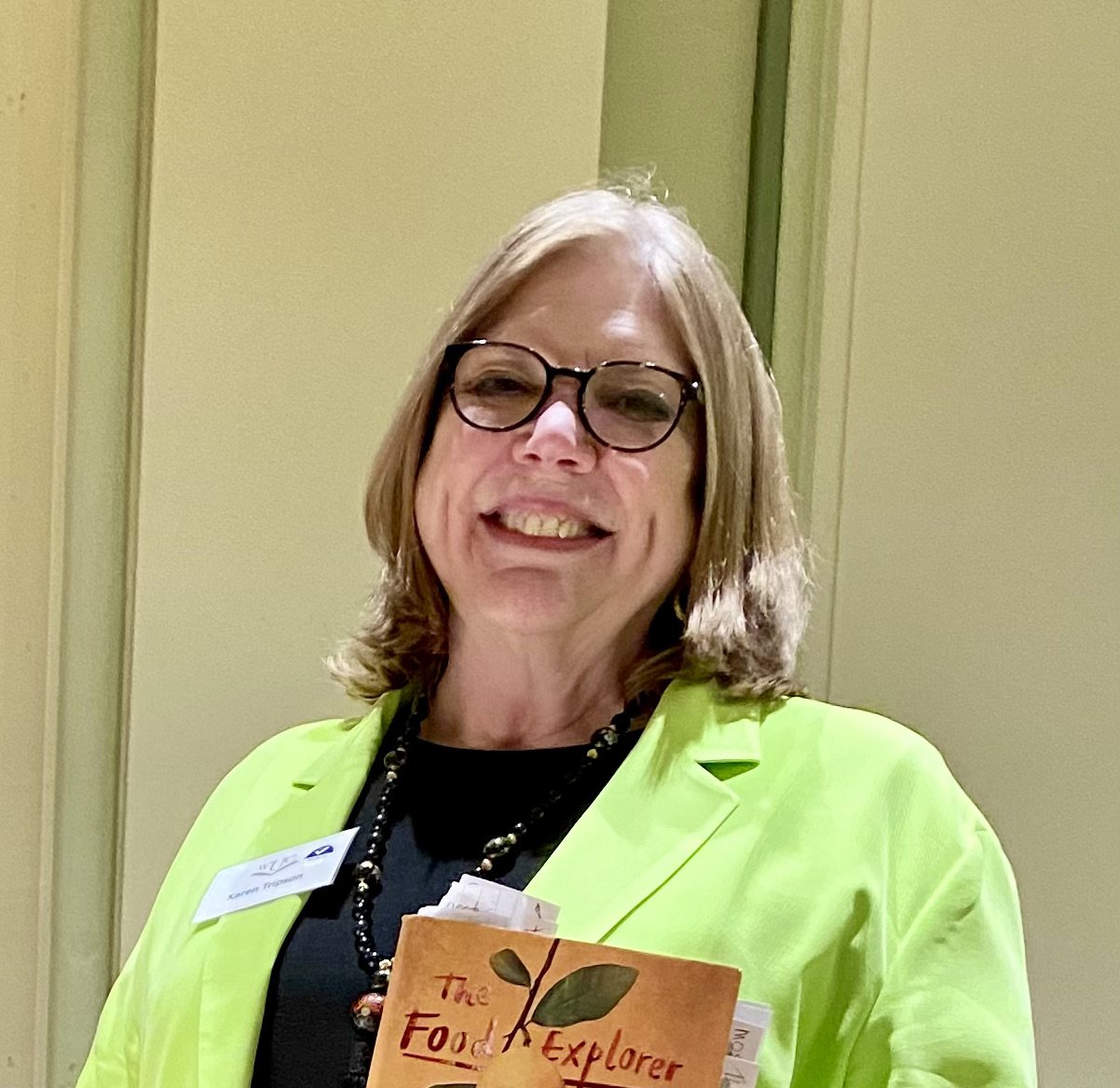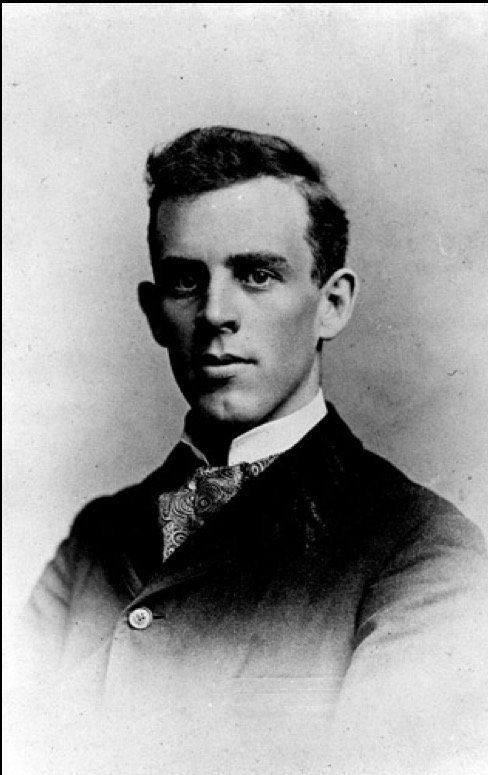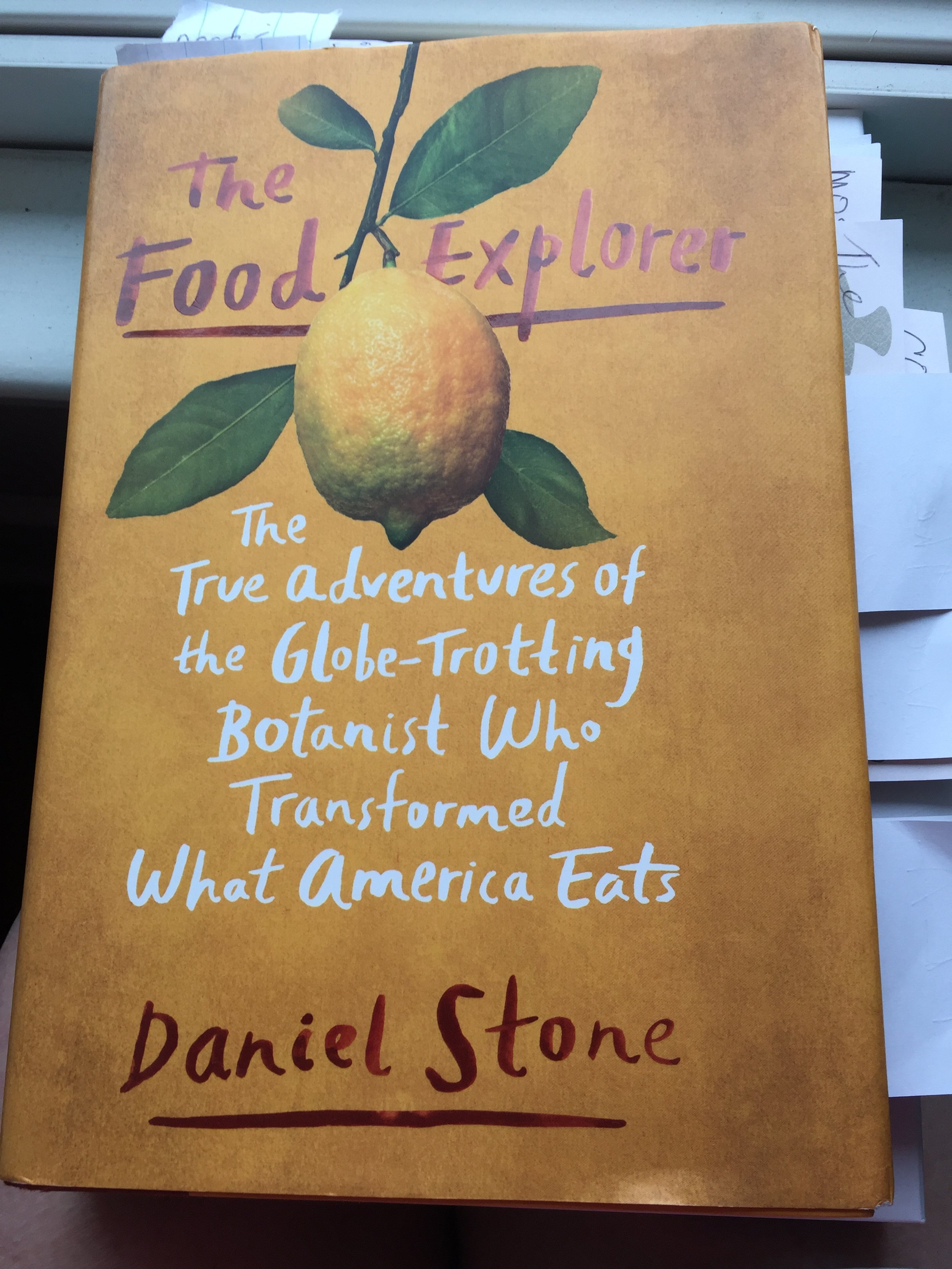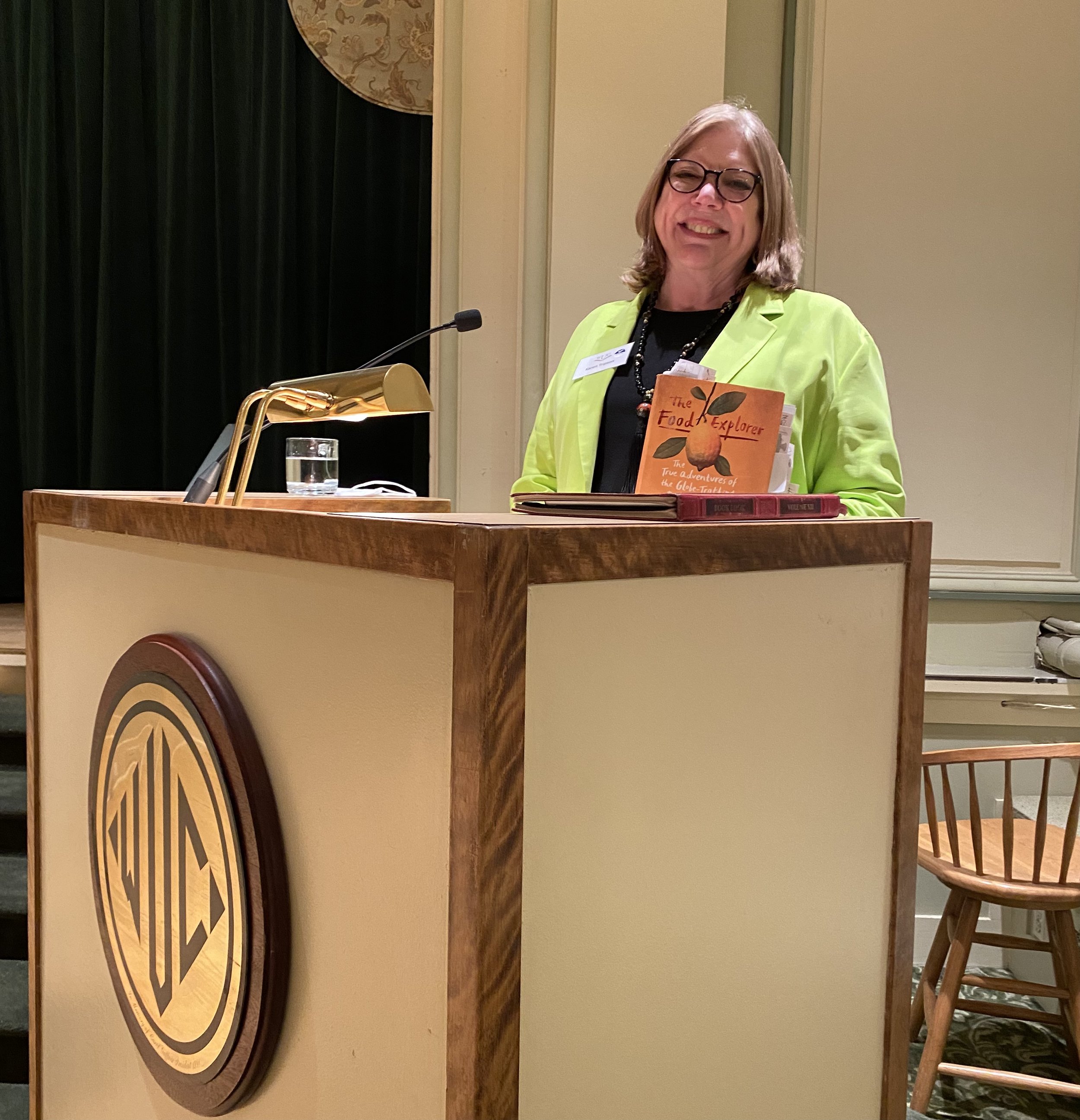The Food Explorer Presentation
Seattle Womens University Club Feb 9, 2022
Thank you all so much for coming. My book review today is on The Food Explorer written by Daniel Stone and tells the story of David Fairchild, a famous botanist and world traveler who was born in 1869 and died in 1954. I’m a lifelong food enthusiast; I love to cook, to read and to write about it. I love travel the same way. I read, I go, and I write about it. As you know I do all that in my novels plus love. I have read Fairchild’s memoir, The World Was My Garden. It’s a delightful reading experience. His character is apparent on every page–he is a good human being. I was very excited to read more about Fairchild.
I have a small connection to David Fairchild. His name is one I know from childhood. He was a friend of my grandfather who developed a tropical garden that opened in 1932 to boost tourism, the McKee Jungle Gardens in Vero Beach, FL. He employed landscape architect William Lyman Phillips, from the firm of Frederick Law Olmsted. Fairchild sent my grandfather tropical plants to try and employed the same landscape architect for his property in Coconut Grove, FL.
Fairchild’s Early World
I think to understand the man, it’s helpful to know a bit about his beginnings. The early settler Fairchilds were academics employed by education, not farming. But the colleges they were involved with were mainly land grant colleges created to improve agriculture. David’s grandfather was the founder of Oberlin College. His three sons all became college presidents, one of them was the president of Oberlin for 25 years. Oberlin had liberal leanings in some concepts such as educating women and later black people, but the stand on religion was inflexible. Fairchild grew up and studied on the college campus of Michigan State until he was ten years old, where his father was a professor of English and then at Kansas State where his father was the president. There were two buildings and the president’s house on the Kansas state campus at that time and no trees. He lived with the same strict Protestant rules of thinking and conduct that his father had grown up with. The intellectual future of the country was the primary mission. There were many debates about politics and philosophy but no music, dancing, card playing, theatre, swearing or drinking. Until his Aunt Sue from New Jersey who had classical music in her fingertips, visited when he was a teenager, the only music Fairchild had ever heard was the church choir. Aunt Sue wanted to read aloud David Copperfield to the five kids which horrified his father because of Dickens use of caricature which was not Christlike. He permitted her to read out of politeness to a house guest. David Copperfield remained one of Fairchild’s favorite novels, he thought of it as a romance.
Fairchild and his boyhood friends were fascinated with natural history from a very early age. They knew the names of all the plants and trees. A little microscope and the world it revealed was their favorite pastime. He knew all the professors and sometimes they accompanied the kids on expeditions into the fields, the streams and a culvert they loved to play in. As a boy the blights that attacked the surrounding wheat fields were of great interest. His father traveled to Washington DC in 1887 to help push through legislation to get funding for Federal Experimental Stations at the land grant colleges which was memorable to Fairchild as it brought powerful microscopes into his life. His uncle Byron was a botany professor at Iowa State. David went to live with Uncle Byron and Aunt Sue in Iowa to study botany and moved with them to New Brunswick, NJ to do more postgraduate work at Rutgers College when his uncle got a teaching job there. He loved living with them. With her interests in music and literature and his uncle’s in botany, it was such a different life than Kansas. He saw the Atlantic Ocean for the first time which was a profound experience. Within a year of studying at Rutgers, David was invited by a friend of his uncle to join the Department of Agriculture in Plant Pathology in Washington DC for one thousand dollars a year salary. He was 20 years old. In the first year of that job, he gave an illustrated presentation on plant diseases to the Horticultural Society of Western New York. The gray bearded crowd was stunned to see a youth arrive with a roll of starched cotton cloth with charts and colored drawings labeled in Latin. When they kept him for another hour after the lecture to answer questions, he realized he was an authority on a new science. Looking back at his life as an older man, he said that becoming a botanist was predestined by his heredity and environment, although he wandered into it all by himself.
What America Ate Before The 1900s
The food of the early settlers was bland and beige. Due to the short growing season on the plains, apples and grapes were the most common fruits and a few root vegetables were grown. Porridge began the day and bread, cheese, boiled pork or beans made lunch and dinner. The popular thought at the time was that spices and condiments should be used sparingly or else cause indigestion. Pork was the preferred livestock because pigs would eat anything and drank little water while providing substantial calories. The graham cracker was developed to control unseemly sexual urges. The banana was introduced in 1876 at the World’s Fair wrapped with tinfoil to disguise its offensive phallic shape and was to be eaten with a knife and fork. In the 1880s Kellogg developed peanut butter, granola and soy milk. Even though they didn’t know it, Americans needed more colorful items in their diet.
Fairchild Began Traveling The World In 1893
You had to be brave, hearty and resilient to travel in those days. Fairchild was giddy over his good fortune to make his first trip across the Atlantic by steamship. Only the rich could afford to do this and it was beyond the wildest dreams of most people. His strict upbringing held him in good stead for the rigors of travel in those days. He never complained about anything. He learned early he got seasick, never got over it and almost never mentioned it. He remained selfless throughout his life. He often got the worst accommodations on a ship, shared a room with strangers, sometimes even slept in chairs. He loved the ocean crossings because it gave him time to write and think. It was easy enough in sunny Corsica to ride a donkey when that was the only choice for trying to find a citron. However, crossing the Andes Mountains from Santiago to Buenos Aires, a 12-day trip in those days, his donkey slipped in the ice and barely avoided falling off the narrow trail straight down a thousand feet. The donkey’s heroic effort to save his own life with David clinging precariously to the animal, rocks and mud, made his traveling group speechless for a full minute but no one remarked on it. David was silently grateful for being alive. When they reached Buenos Aires, his traveling companion Mr. Lathrop insisted they take a boat to Rio de Jannero, no more land travel.
I know eating can be iffy on the road. I am so careful in certain places to only eat peeled fruit and cooked things. I pass on street food that smells divine when there’s no way the vendor’s implements could be cleaned. I don’t know how David Fairchild spent almost ten years on the foreign back roads without poisoning himself. When a fresh fruit and vegetable market appeared Fairchild fearlessly tasted everything to decide if it was worth saving the seeds. If he ever got sick, he didn’t mention it. He had common sense. On a boat that was quarantined for a week he noticed the filthy hands of the boys cooking and declined the meals offered and ate only boiled onions.
The heat of the tropical jungles in Java, Malaysia and Panama were debilitating to many travelers. Fairchild said, after growing up in the Kansas, no place seemed too hot to him.
During a typhoon with the ship rocking so violently people sitting in furniture and objects were flying around he told funny stories to distract the other passengers from their terror of imminent drowning.
Hostile natives were occasionally ready and willing to kill our hero. Fairchild managed to be friendly with the cannibals of Borneo but did not linger. He had to respectfully report to Washington DC that the Filipinos and the Hawaiians were not ready to discuss plant exploration and even a military escort wouldn’t help.
The Important People in Fairchild’s Professional World
Mr. Lathrop as Fairchild called him in the early years and later Uncle Barbour, was a rich gentleman’s gentleman. His club in San Francisco was the Bohemian Club for men unfettered like himself with family and houses. He had the penthouse apartment above the Bohemian club for his rare visits to his adopted home city. He traveled continuously around the world, mostly by boat where he sat at the Captain’s Table and slept in the First Mate’s Cabin reserved for VIP guests. He loved to hold court and tell embellished tales of his travels. He met Fairchild on the ship of David’s first trip to Europe and made a note to himself to run into him again. Eventually he offered to pay Fairchild’s Department of Agriculture salary and travel expenses for exploring the world for plants to send to the office in Washington DC. Lathrop’s generosity was not viewed that favorably by the Secretary of Agriculture who preferred for Fairchild to stay Washington DC and manage the department. They traveled for three years on the first trip and ultimately spent eight years on the road together tasting fruits and vegetables and sending plants and seeds to Washington DC. Aside from funding their travels, Lathrop walked behind Fairchild in the markets and contributed his highly developed palate to approve of food selections. They were friends for 35 years and Fairchild named one of his daughters Barbara Lathrop.
Famous for creating the telephone and the Bell Telephone Company in the United States, Bell was an inventor and entrepreneur who immigrated to America from Scotland. He was the central part of the science community in Washington DC, ex-president of the National Geographic Society. He heard Fairchild speak in August of 1903 at the Society about his recent trip to the Persian Gulf and finding the fruit date in Bagdad, Iraq that would become the parent of every date you buy in the grocery store today. Fairchild stressed his usual message about the importance of the government investing in plant introduction to educate the farmers about new crops that could make the agriculture industry powerful, financially successful and create significant jobs. Bell was so impressed he invited Fairchild to a Wednesday Evening which was an elite weekly gathering of 25 or 30 scientific friends for dinner and conversation. It was considered prestigious to be invited. Fairchild hadn’t been in town in for five years and knew very few people. He was very comfortable to be in the presence of scientists. Bell seated Fairchild next to his daughter Marian who was about 21, educated, sophisticated and interested in art. Within two years they married and formed a lasting partnership devoted to plants and gardening with their last great project, the Kampong in Coconut Grove, FL. They traveled every year with their three children to the Bell summer home in Nova Scotia with 12 bedrooms so all the grandchildren could be there. The summer home was yet another laboratory for Bell who stayed up all night every night doing calculations and research on his new inventions for testing the next day, one of which was an airplane. Fairchild felt very fortunate to have enjoyed a long, close relationship with Bell and his wife.
The author of this book interviewed one of the grandchildren, who at 81 still had lots to say about these lively family trips to Nova Scotia. One of my favorite anecdotes of these trips in another era was that Fairchild gave the grandkids a quarter for every interview they conducted with a stranger where they learned something new. I was shocked. All I could think was that gas stations were more civilized in those days and there were obviously no helicopter moms on these trips. But I read on that he wasn’t completely throwing them to the wolves, he also advised on how to back away when they realized there was nothing to be learned. He also reminded them to never be satisfied with what they knew, keep looking to learn more.
Frank Meyer—the best plant explorer
When his choice of marriage and family life ended Fairchild’s full time traveling days it was hard to find employees to replace him who had what he knew it took to be a plant explorer: “the burning curiosity for newness, the instinct to feel around in the dark and stumble headlong toward the unknown.” The most important plant explorer he hired was a Dutch horticulturist, an eccentric with odd dressing and poor hygiene habits who loved to walk. That made Frank Meyer perfect for exploring China which had no roads and could only be traveled on foot or in a chair carried by men. In his first 3 years of exploring, he introduced the Meyer lemon with his name that helped the lemon growers of CA, he sent thousands of fruits, plants, shrubs and bamboo species. Meyer’s finds of special note include asparagus, soybeans, and Manchurian spinach. Fairchild took him to Long Island to meet President Teddy Roosevelt to show Meyer’s photos of the “mountain east of Beijing, where he had witnessed such devastating deforestation that it triggered landslides that cut off rivers, suffocated farmland and washed away entire villages.” The president got Meyer’s permission to show the photos to Congress. Through his frequent correspondence with the office in D.C. his thrilling and chilling adventures in China were repeated in newspapers and made him quite well known. Fairchild and Meyer corresponded as dear friends until death.
Charles Marlatt—Friend and Nemesis
In every office or career there are challenges of personality and ambition. It is my feeling that working in Washington DC with politicians and bureaucrats while enduring regular negotiations for the budget of the department to do a better job of spreading the new plants and seeds around the country, Fairchild ran into many more difficult situations than he felt like recording. His most prominent nemesis that he mentions with frustration but not too much vitriol is Charles Marlatt, a boyhood friend from Kansas. Marlatt was a few years older and an insect expert, not a plant expert. He was Fairchild’s best man at his wedding as the two first choices were out of the country. Marlatt had some sour grapes from the beginning of their careers because of the early jobs Fairchild got through friends and family. After Fairchild married the Bell Telephone heiress, Marlatt was not able to afford to get married for another four years. He honeymooned in China to save money while doing Department of Agriculture work and his new bride got sick and died in China. That was rotten luck. All the publicity of Frank Meyer’s death defying adventures in China inspired him to look very closely at what bugs and vermin these Chinese plants were introducing into American soil. Thus began a long, loud, public campaign to close the country to Immigrants and immigrant plants. He even named a new evil Chinese insect after Frank Meyer.
Spectacular Successes
There are two steps to introducing new foods: first is finding and bringing a food across the ocean. The second is getting consumers to like it. Although Fairchild had tasted many avocados, a black skinned one with a buttery consistency from Chile was superior to varieties in other countries. It was a huge success for CA farmers but through an unlikely series of events, a man in CA filed a patent for Fairchild’s avocado naming it Haas after himself. Examples of other Fairchild plants that established a solid popularity with farmers and the public in the US include:
Kale from coast of Austria-Hungary
Red Seedless Grapes from Italy
Dates from Iraq
Wheat from Spain
Nectarines from Afghanistan
Papaya from Ceylon
Cherry Blossoms from Japan
Mango from Vietnam
Citron from Corsica
Pomegranate from Malta
Cotton from Egypt
Soybean from Indonesia
Watermelon from Chile
Dwarf Pineapple from South Africa
Failures
Quinoa: Fairchild liked it and thought the Incas who made it the center of their diet were smart but it seemed like another grain to him and in 1898 there was no equipment to measure the nutritional content to learn it was a protein with all nine amino acids the human body can’t produce. Quinoa wasn’t labeled a superfood until 2005.
Cashew nuts: Farmers thought it was too much trouble and took too much water.
Mangosteens: Fairchild’s favorite fruit and a huge personal disappointment when it flopped with the public.
Chayote
Dasheens: I’d never heard of it either. It’s a root vegetable.
The Legacy
Although Fairchild said it didn’t matter to him what happened to his property after he died because he had enjoyed it in life, the fact that it is alive and prospering 70-odd years after his death is a comment on the quality of the property. There are several pieces of property in Fairchild’s Legacy and I won’t explain them all. I will highlight the homestead in the Miami area, called the Kampong, Malaysian for village, is now one of the five gardens of the National Tropical Botanical Garden Organization. A large staff is employed to run the business of plant studies and tourist activities. The laboratory and the old plants are an important resource for horticulturists around the world trying to correct new diseases or improve their stock. The house is used for offices and storage of Fairchild’s correspondence. Thousands of tourists, school kids and gardeners wander, take guided tours, take courses in botany and enjoy the fabulous variety of tropical plants in the landscape. Weddings and parties in these beautiful settings with a view of Biscayne Bay are popular. You can learn more on the web site of the NTBG.org and watch YouTube videos of garden tours.
Karen Tripson Reviews The Food Explorer at the Seattle Womens University Club
Daniel Stone–the Author
He’s young and has a short resume. His website, which is mostly about this book, says he’s worked as a journalist, published articles in few magazines and had a job at National Geographic magazine (which used to be considered the family mouthpiece of the A. G. Bells). Stone has written one other book on the topic of shipwrecks, the men who obsess about finding them and how the ships disintegrate on the bottom of the sea. I thoroughly enjoyed the story which moves quickly. The book is not dull or boring at all or laden with cumbersome scientific terms. I hope some of you here today will decide to read the book. I hope the Food Explorer will launch Stone’s career as an author.
Why I Recommend This Book
The Food Explorer is an adventure story set around the globe before cultures became homogenized by commerce. Maybe Fairchild got the last glimpse of the old world before it became the modern world. He was filled with wonder at everything he saw. I cringe when I see a McDonalds in Paris littering the cityscape with the golden arches and helping the French people who have a fine cuisine of their own to eat bad American food that will ultimately ruin their health. I love the old photographs Fairchild took everywhere he went; his color drawings of fruits are quite good and I admire his clear descriptions of the people who lived in these faraway places. Occasionally, Fairchild was the first American man the locals had seen. Most of the people he met seem genuinely interested in helping him find whatever he was looking for even when they didn’t speak the same language. Perhaps he just came across as trustworthy. He entered in to lifelong correspondence with many of the people he met while traveling.
Fairchild makes a great hero in a white hat on the side of honesty, good manners, and dedication to his enterprise to help the agricultural industry. He is endlessly curious about everything. That’s appealing to readers who are looking for a wholesome story that’s uplifting. For the armchair traveler, it’s a historical experience no one can buy today. You don’t have to be a botanist or a gardener to enjoy the tale of the expeditions. Most readers will fall for Fairchild leading the way and follow him anywhere.
It has been a pleasure talking to you today. Thank you so much for coming. Does anyone have any questions?




